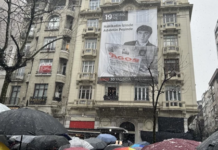(1) Do you think the massacres and deportations of 1915 amount to a “genocide”?
Yes, I do, and I have repeatedly said so in the past — in various articles, papers, interviews or panel talks (since 2002) that have become too numerous to recount.
In 1915, the government of the Committee of Union and Progress, and more specifically its ruling triumvirate (or military dictatorship) of Enver, Talat, and Cemal Pashas, ordered certain harsh and arbitrary measures against the Armenian subjects of the Ottoman Empire for no other reason than that they were Armenians (who as a whole had come to be regarded as a suspect population in the eyes of the CUP’s new-found Turkism and Social Darwinism). Purely on this basis, they were rounded up within 48 hours of the initial notice, forced to leave all their properties behind, allowed to take only a bare minimum of money and belongings with them, and deported in the form of long convoys marching in the direction of the Syrian desert. All that they abandoned was quickly confiscated by the state.
Hence, just this much was genocide itself under the 1948 UN Convention — because it amounted to the total or partial destruction of the conditions of existence of a people or (ethno-religious) community. But also, as the Armenian convoys entered eastern or southeastern Anatolia, they were increasingly subjected to “mysterious” attacks resulting in huge massacres. By putting together bits and pieces of evidence, it is possible to demonstrate, beyond a shadow of reasonable doubt, that this first round of attacks was deliberately organized by henchmen of the CUP’s Special Organization, so-called (Teşkilât-ı Mahsusa), who had already been deployed far afield to organize convicts and other rabble into death gangs, and also to incite Muslim tribes previously displaced from Caucasia by Tsarist Russian expansion to slaughter these other hated Christians.
And once these primary massacres signaled everybody that the Armenians were no longer under the protection of the law (that the shooting season was open and they were fair game for all), as frequently happens in such situations, the worst elements of the Turkish-Muslim population, motivated by opportunism, jealously, greed or hatred, also began to conduct their local, smaller-scale secondary or tertiary pogroms. As a last blow, bunches of miserable survivors straggling south into the desert were further decimated by hunger, thirst, disease, or sheer exhaustion.
How many died in the process? There is a crass, callous game of numbers still being played by Turkish nationalism, which tries to minimize the death toll to as “few” as 250,000, versus Armenian nationalism, which tries to jack them up to a million or more. The first, already hideous as it is, is probably too little, and the second much too much (indeed, very close to the entire Armenian population existing at the time). Much more realistic is 600-650,000, which is more or less what the Encyclopaedia Britannica has cited throughout.
So the net result was the near-complete extermination and annihilation of Ottoman Armenians, leaving very few survivors inside Turkey as against a much larger worldwide diaspora. Was it genocide? Of course it was, and as I have indicated, not just because of the mass murders involved. At the same time, do I like this term genocide? In particular, do I like the debate over what happened in 1915 to be reduced to the question of: Was it genocide or not? Please be brief; yes or no? This time my answer is an emphatic “no.” Why? Because the g-word is much more of a lawyer’s term than a historian’s. It has come to be defined as a crime in international law. Hence, too, it has become a buzzword, a cliché, a reductive substitute for real historical understanding. Whenever it is used, it immediately creates a courtroom atmosphere where historical evidence and arguments are transformed into appendages of a legal file, whether for the prosecution or the defence. Last but not least, it makes Turkey and the Turkish public feel as if they have been put in the dock, and are being collectively accused of a crime against humanity. All in all, instead of facilitating progress and the liberalization of the conversation, it tends to obstruct and to stultify it. It is, now, quite possible, in Turkey as elsewhere, to conduct a reasoned debate over just what happened in 1915 without reducing it to genocide-or-not, posing and answering a series of questions in a calm and deliberate way. When the g-word enters the picture, however, the whole situation is hystericized, and a relatively rational discussion becomes impossible. It is a pity, for large sections of the Turkish public are capable of being persuaded that the CUP leadership ordered and did something terrible, without necessarily agreeing that it was genocide.
Perhaps we should remember what Shakespeare implied (in Romeo and Juliet):
What’s in a name? That which we call a rose,
By any other name would smell as sweet.
(2) Why does Turkey refuse to review the past?
It doesn’t. It used to — back in the 1980s or 90s, but no longer. At least not to that extent. The denialism of the past was based on ancestor worship, or ideological allegiance to Unionism and Ataturkism. What had happened to the Armenians in 1915 was seen as a black blot for Turkish nationalism. Also, while it was not committed by or under the Kemalist Republic, because the Republic had ended up inheriting the mantle of a territory ethnically cleansed of the Armenians, it was in the nature of an inadmissible impurity for the desired lily-white legitimacy of the Kemalist Revolution. So a taboo was placed on it; it became part of the unmentionable and indiscussable. Here and there a few academics, mostly living and working abroad, did speak up. They were lonely voices in the wilderness.
Things began to change from 2000 onward. A few international workshops brought (non-denialist) Turkish, Armenian, and American-Armenian academics together for the first time. They made a fresh start by not stooping to political bargaining and bickering, but beginning to talk in a scholarly way and to engage in a common project of knowledge. Some among them took a further step by coming out of the closet to grant interviews to leading Turkish dailies, thereby cracking the wall of silence. Initially, with each such outspoken statement there was a nationalist uproar, which however began to subside as more and more courageous voices joined the fray.
At the same time, a new force not from the traditional center but from the long-ostracized periphery of Turkish politics won the 2002 elections, coming to power and consolidating it over the next fourteen years. The AKP was not and has not been part of the Unionist-Kemalist state tradition. Its ideological outlook has been more moderate Islamist than outright nationalist. As such, it has sought to distance itself from the old taboos of statist nationalism — over Cyprus, over the Kurdish question, and also over the Armenian question. This relatively enlightened skepticism has been both fed by the above-mentioned emancipator efforts of academics and public intellectuals, and also extended a degree of previously missing protection to them. Crucially, over 2002-2016 the AKP has not engaged in any domestic witch-hunts or other exercises of psychological terror of the sort that used to be directed in the past at those speaking out in recognition of the historical truth (with or without the g-word) of what happened in 1915. It has also taken direct steps to ensure, for example, that an all-important anti-denialist conference could be held back in 2005. It has also largely stopped manufacturing pseudo-history through state institutions like the Turkish Historical Society (from which most of the virulently anti-Armenian old guard of hack writers has been rather quietly removed).
This dialectic between intellectual-scholarly struggles and a more moderate government approach has led to a comprehensive liberalization of Turkish space, contributing, at the civil society level, to a degree of normalization of the conversation that would have been unthinkable twenty years ago. In politics, it has led to the utterly unprecedented step of two successive message of condolences to descendants of the Armenian dead of 1915 being issued, in 2014 and 2015, by (respectively) PM Erdoğan and PM Davutoğlu. Through these texts and elsewhere, moreover, the government has officially recognized that in itself, the Deportation (Tehcir) of 1915 was illegal and a heinous crime.
So all this cannot easily be summed up as a simple refusal to review the past. At the same time, it is also true that the government has stopped short of using the word genocide. Otherwise put, there has been considerable progress, even within the establishment, in terms of reviewing and confronting the past — without however the kind of short and immediate “genocide recognition” as demanded by Armenia, the Armenian diaspora, or most of the outside world. My hunch is that this is no longer a question of history but of diplomacy. It is probably related to your questions 4-5-6 as given below. It may be that the Turkish government does not know what might happen if it were to go ahead and say yes, it was genocide. What would Armenia be likely to do or demand? Is it going to ask for material compensation, or even land? That is what the Dashnaks as radical Armenian nationalists have been saying all along: Three R’s, as they put it; Recognition, Reparation, Restitution (of land). Certainly the last is something that no Turkish government can possibly ever concede. It is very likely, therefore, that before they take any further step, they would like Armenia to show its hand. Conversely, as long as Armenia keeps its cards close to its chest, recognizing the genocide as genocide will have to wait. Let me emphasize, however, that this is not intended as any second-track defense or for that matter critique of Turkish policy. I am trying to be as neutral and factual as possible. It is absolutely nothing more than a single individual’s educated guess.
(3) Is there a legal obligation to recognize it?
I don’t really understand this question. How can there be a legal obligation (in Turkey) to recognize the Armenian genocide? If there was, the question would long have been over and done with. Or are you asking if there is an opposite legal obligation not to recognize it? No, neither is that the case. In other words, there has never been anything in Turkish law prohibiting anti-denialist, historically truthful discussions of what happened in 1915. Especially before 2002, and even afterwards (though no longer by the government), there has been a huge amount of informal, extra-legal pressure, blackmail, threats or other forms of psychological terror brought to bear on people like me, which I and others have all had to face. But no, there has been no legal ground for prosecution (not unless you engage in reverse-racism by saying things like “all Turks are criminals and murderers” — which as a general smear on Turkish identity could be prosecutable under a separate, non-1915 specific article). I, for example, have been speaking out on 1915 ever since 2000 (with and without the g-word), but no charges have ever been brought against me. It is also true, of course, that not because of any conscious political prudence but simply as part of my historian’s training, I have always been careful about historical agency, refraining from engaging in blanket accusations about “all Turks” (or for that matter “all Greeks” or “all Germans” or “all Spaniards” or “all Armenians”).
(4) Does Turkey believe that there could be unjustified territorial claims (in addition to the issue of compensation to descendants) by Armenia behind this demand for genocide recognition?
Yes, I think so. As I have already tried to indicate in the last paragraph of my response to Question 2, if not an absolute belief, at least it is regarded as a distinct possibility, and therefore a source of some anxiety. Let me repeat what I said above —
It may be that the Turkish government does not know what might happen if it were to go ahead and say yes, it was genocide. What would Armenia be likely to do or demand? Is it going to ask for material compensation, or even land? That is what the Dashnaks as radical Armenian nationalists have been saying all along: Three R’s, as they put it; Recognition, Reparation, Restitution (of land). Certainly the last is something that no Turkish government can possibly ever concede. It is very likely, therefore, that before they take any further step, they would like Armenia to show its hand. Conversely, as long as Armenia keeps its cards close to its chest, recognizing the genocide as genocide will have to wait. Let me emphasize, however, that this is not intended as any second-track defense or for that matter critique of Turkish policy. I am trying to be as neutral and factual as possible. It is absolutely nothing more than a single individual’s educated guess.
(5) Should Turkey pay compensation to descendants of the Armenian citizens of the Ottoman Empire? Or to the Armenian state?
These are legal and political questions that, frankly, I have always refused to pursue, and therefore also questions that I don’t really know much about. As a historian my primary concern has always been about the historical truth, and therefore also the absolute and non-negotiable freedom to talk and write about it, to discuss it, to publish about it as normally as the law of gravity or biological evolution. This is something that I owe to myself, my profession, and my fellow citizens. Regardless of the consequences. And let me underline that any such consequences will not devolve automatically, in smooth linear fashion, from historians’ findings and conclusions. Instead, they will be the outcome of politics, of diplomacy, hence of power relations between nation-states such as may crystallize at any point in time. That is a game not for historians but lawyers and politicians.
(6) The problem of the denial of the Armenian genocide has a big impact on Turkey’s diplomatic relations. Given that, why does Turkey still refuse to review the past?
I have already said that the situation can no longer be described as simply “refusing to review the past” (see Question 2 above). So I’ll simply confine myself to the much more narrowly defined “genocide” problem.
Not everything about a country can be decided externally, within the sphere of international diplomacy. There is also the sheer domestic weight of the society in question, its mass and inertia, which has its own dynamics, and can be difficult to turn around. Neither can it be a matter of a purely rational cost-benefit calculus. The past can be an enormous dead weight on our back. There are questions of ideology, as well as of related political rivalries, to consider.
Despite all the progress achieved since 2000, there is a continuing problem of the strength and durability of Turkish nationalism. It has its roots in the late-19th and early-20th centuries, when virtually everybody was bullying and trying to take its share from tearing apart the Sick Man of Europe. The new Balkan nationalisms hugely persecuted and ethnically cleansed their Turkish-Muslim populations, causing a massive exodus from Southeastern Europe (or Crimea, or Caucasia) into Anatolia. The Great Powers mostly protected their fellow Christians against the “Muslim other.” This loss of empire was a profound trauma, against which incipient Turkish nationalism developed its own sense of victimhood and resentment (which fed into the sort of murderous vindictiveness that perpetrated the Armenian genocide). This feeling of always being discriminated against by the West has continued to this day. It has been further reinforced by the explicitly and scandalously Islamophobic reactions that the AKP has been subjected to. “They will never accept us as equals; they will never take us into the EU; they have this Eurocentric, Orientalistic contempt for us Muslims which will never go way.” You keep hearing this all the time. Faced with the peculiar challenge of recognizing the Armenian genocide, large sections of the Turkish public as well as the AKP also keep asking, and will keep asking: Why us? And why only us? Are all nations being asked to atone for their past equally stringently? Or is it just Turkey? Meanwhile, what about what “they” did to “us” in the first place? If we recognize the Armenian genocide, will they, too, ever so slightly recognize the tragic plight of the Muslim Turks of Crete, mainland Greece, Bulgaria or Serbia? Who speaks for the Turk? Do we have any friends in the world? (I could add: How much of the Russian public is willing to recognize the Katyn Forest Massacre, and to support the idea of formally apologizing to Poland for it? How many Israelis are vocal in condemning and politically opposing what has been done to the Palestinians since 1948? Or, forgive my ignorance, but has the Church in Spain fully owned up to its role during the Civil War or for subsequently supporting the Franco dictatorship?)
I am not bringing up all this to relativize the Armenian genocide by comparing it with others’ sins, nor to justify it (as some ultra-nationalists are cruelly fond of doing) by insinuating that it was justified revenge and/or anti-imperialist self-defense — but only to point out that here, indeed, is a very real craving for psychological compensation that the rest of the world would do well to take note of, though it fails to do so because it cannot bring itself to see Turkey from the inside. And in the face of all the much more nationalistic blackmail that it has already had to cope with from the Ataturkist CHP or the fascistic MHP opposition, it certainly is not anything that even with the best of intentions, even the majoritarian AKP government can afford to ignore.
Add to it the anxieties about compensation or territorial demands that I have previously cited. Further add to it the official perception that while the AKP has been moving out, taking risks, and making various gestures through the government’s 2014-2015 messages, as well as all the other internal steps that it has been more quietly taking, far from being even half-appreciated, they have all been comprehensively ignored. That Armenia and/or Armenians have refused to grasp the hand that has thereby been extended. That instead they may have taken it as a sign of weakness, preferring to continue flogging a horse that has fallen in the water.
Once more, I am not saying all this to defend or to apologize for the surviving elements of négationnisme in Turkish diplomacy. Instead, I am trying to put together my observations.
But so, could all that be the beginning of an understanding about why “third party” genocide recognition resolutions or other forms of outside pressure are not that likely to work?













